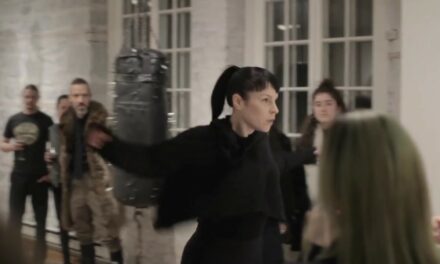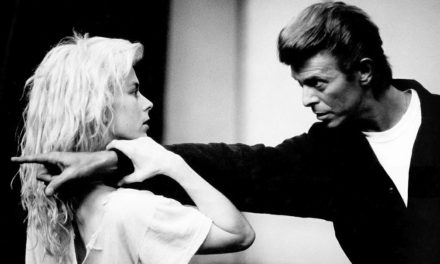NEeMA: Leonard Cohen Protégé Talks Diamonds, Dalai Lama & Meeting Her Mentor
by Evelyn Reid
Interview originally published on About.com June 28, 2010
NEeMA, born Nadine Neemeh, beams whenever she speaks of Leonard Cohen, her friend and mentor, an instrumental force in the production of her second album Watching You Think. On the road since it was released in the summer of 2010, the singer-songwriter played at the Montreal Jazz Festival and POP Montreal, wrapping up a North American tour later in 2011.
I had a chance to sit down with her that summer to discover a well-traveled past, including brushes with Mother Teresa, the Dalai Lama, and a seven-year-old Egyptian delivery boy too busy supporting his family to go to school.
But it was back home in Montreal that she met Cohen, the elusive legend who pushed her and her sound to go to depths she hadn’t yet explored on her own.
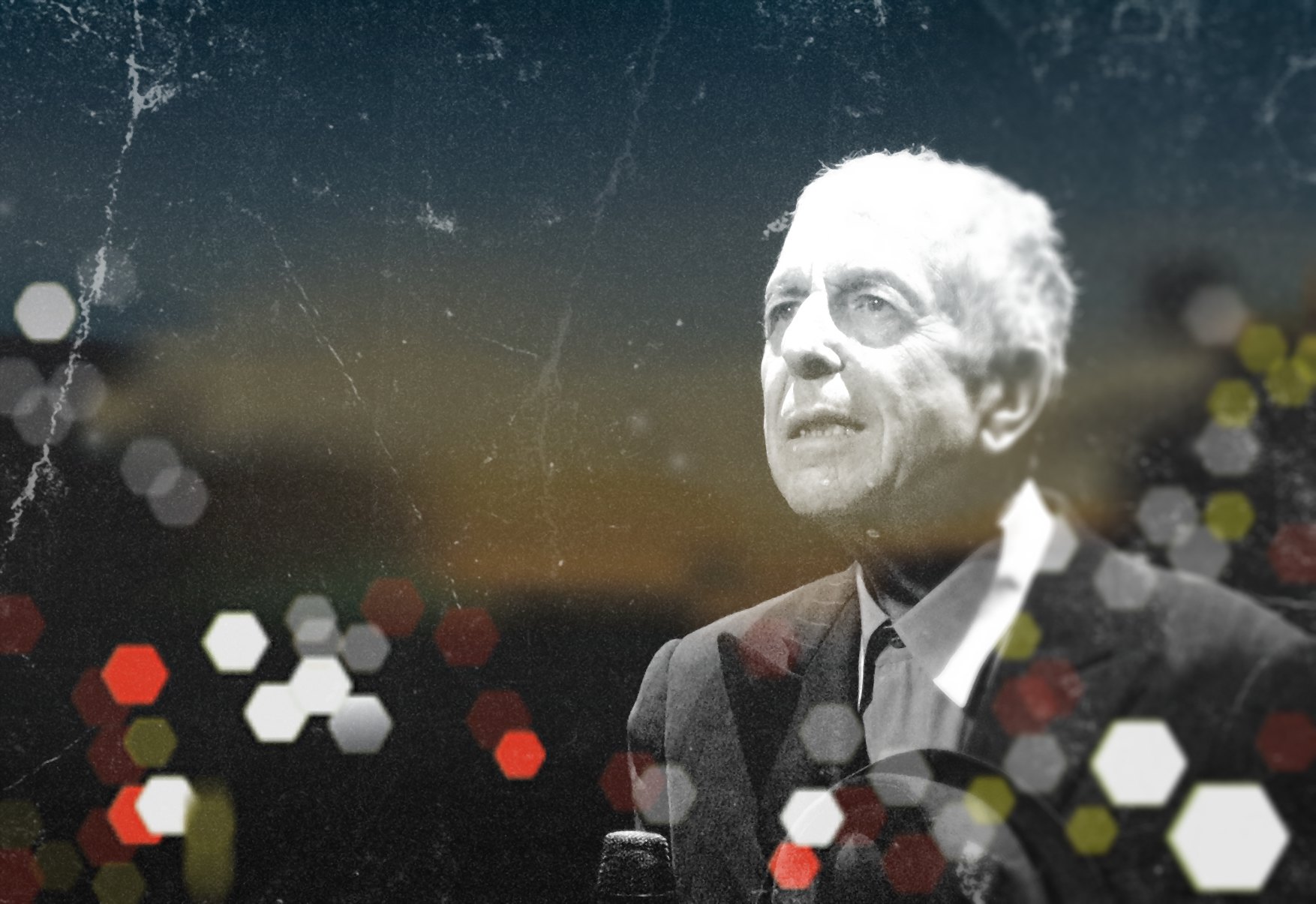
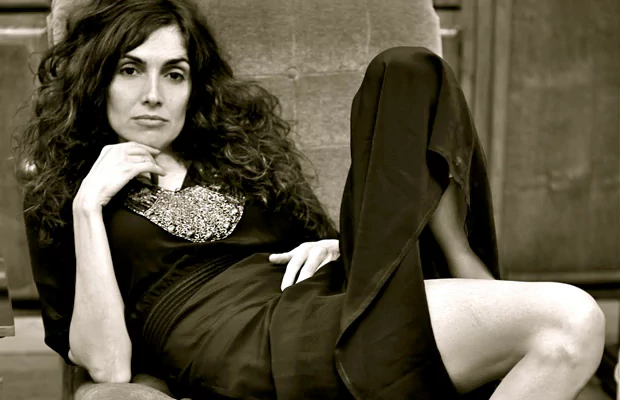
“He gave me his feedback, which was sometimes really, really hard, and sometimes really great.”
-NEeMA
(Top left: Leonard Cohen in concert circa 2008 (original photo by Rama , modified by Clint Lewis (CC BY-SA 2.0 FR)
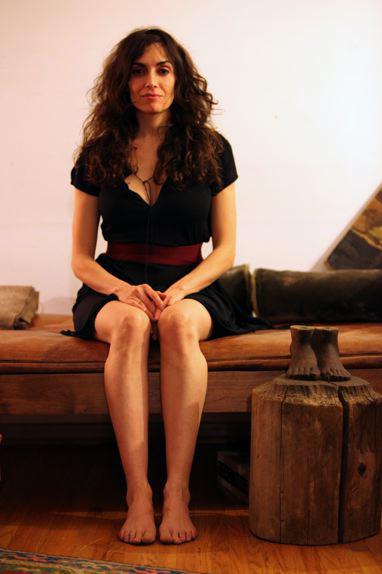
June 28, 2010 – I’ve been inside the Maison du Festival—the Montreal Jazz Festival’s headquarters—several times before, but never from this particular vantage point, in a “green room” on the top floor of overlooking Place des festivals, a public square host to the city’s largest outdoor concerts.
There’s something uncommonly warm about NEeMA.
She’s radiant. She speaks using a calm, crystalline tone with a mild rasp to it, not unlike her singing voice. We’re about to begin our chat, but as per usual, I’m fumbling with my sound recorder, testing and retesting it lest I misquote whom I’m interviewing. “Sorry about this,” I say, frowning, “I’m never ready, it seems.”
NEeMA smiles. “That’s what Leonard said.”
“At some point,” she continues, “years ago, before he was preparing a show—maybe it was the ’93 tour, I’m not sure—he was in his dressing room and a man came to the door. He said, ‘Mr. Cohen, are you ready?’.
Leonard looked at him and replied, ‘no. I’m not’.
And then the man looked back at Leonard and he said, ‘we’re never ready for the things we do in life. We’re never ready to be born. We’re never ready to get married. We’re never ready to die’. We’re never ready for the important things in life.”
She looks at my necklace. “Is that a moonstone?”
“It’s Labradorite. From Labrador,” I said. ”It’s not very expensive. Nothing fancy really.”
“Beautiful. It’s very beautiful.”
“Thanks. Can you believe I prefer it to diamonds?”
Her bright doe eyes look down as she motions to a bracelet on her arm. “Actually, speaking of diamonds, I generally prefer that kind of thing too, like you. But my mother brought me back this diamond bracelet from Egypt, which is, like, crazy. I think because I don’t have a husband, she keeps doing these kind of things! It’s really cute. So now she bought me this bracelet and I’m touched, I understand the whole [sentiment], it’s very sweet, dainty and beautiful but, yeah, it’s the first time I ever had any diamond anything. ”
It is a beautiful bracelet, diamonds or not. “I’ve never owned diamonds either,” I admit. “Guess I’m a pretty simple girl. I don’t even have my ears pierced. I just wear my little necklace with a little charm, like amber, that kind of thing .” and then, I snap out of it. “Wait, this [interview] isn’t about me. This is supposed to be about you!” I smile, slightly embarrassed.
She smiles back. It’s a real one, the kind that crinkles the eyes.
Evelyn Reid: So your mom is Egyptian?
NEeMA: Both my parents are born and raised in Egypt but originally from Lebanon.
Evelyn Reid: From Lebanon.
NEeMA: And then from Egypt, they moved to Canada.
Evelyn Reid: My next question is burning on my tongue. You’re associated with Leonard Cohen… and everyone wants to know, how did that come about? Did you find him? Did he find you?
NEeMA: I hypnotized him.
Evelyn Reid: [Laughter].
NEeMA: We found each other. It’s the truth. We kind of bumped into each other. We live in the same neighborhood.
Evelyn Reid: The Plateau?
NEeMA: Yeah, the Plateau, like, really close to each other and one day we literally bumped into each other and we said “hi.” I was like, “hi, I’m Neema,” he was like “hi, I’m Leonard,” and I was like, “I know,” and then we just kind of started meeting.
We just started going to cafés, going to the park. And he started to draw me and I started to… well, first we became friends, and we just had a lot of natural things that were very dear to both us, that were in common to both of us, our deep spiritual quests, the Semitic background… a lot of things that were natural, just kind of common ground, and the writing… I started to share my writing with him, and then he started to draw me and it just kind of became part of the friendship and then he became a huge, huge source of support and help, like a mentor or teacher on the album, when I was finishing my first album. So, it was years ago, almost five years ago now.”
Evelyn Reid: The first album … Masi?
NEeMA: Masi Cho. “Masi” comes from “merci”… yes, so I just started sharing songs with him. And he gave me his feedback, which was sometimes really, really hard, and sometimes really great. But he, of course, has very high standards for writing, so he certainly doesn’t dish out compliments when it comes to writing.
Sometimes it was like, “I don’t hear the song here, you should start over. Your idea is great but you should just start from scratch.” Then I’d go home and I’d be crushed. Then I’d wake up the next day with a whole new motivation, because I’m also the type of person who wants to go deeper and I’m really interested in not just scratching the surface. I love being pushed further and I love being given constructive criticism, especially from someone I admire so much. And when he would say “this song is amazing,” I’d be like …
Evelyn Reid: You knew.
NEeMA: I knew. I knew he really, really meant it. Or sometimes, there would be a verse and we’d actually sit and work on it together. Or he’d give me some direction, or some writing assignment, or whatever. It was always very enriching. So that’s kind of how it happened. It just started from a chance encounter and then built into a friendship, and that friendship evolved into working together, just sharing my work and getting feedback. And then when I started recording the album, he continued to be [there], getting more involved. I would basically have listening sessions with him every time I went to the studio and he’d give me his feedback on what he heard: the instrumentation, the voice, everything, right up to putting his drawing on the cover. It was a pretty big involvement which was beautiful.
Evelyn Reid: Yes, his drawing “Watching You Think.” I was there for the vernissage.
NEeMA: Were you there?
Evelyn Reid: Yes.
NEeMA: Ah, nice.
Evelyn Reid: I was busy taking pictures of all the drawings.
NEeMA: I was there too.
Evelyn Reid: There were a lot of people.
NEeMA: Yes, there were. Do you remember the drawing “Watching You Think”?
Evelyn Reid: I do. I was going to ask you that actually, the chicken/egg question. Which came first? The painting or the album name? Looks like it’s the painting …
NEeMA: The painting. Yeah. The painting came first, a couple of years ago and then, uhm, actually, I’m not exactly sure when the painting came but it’s been a while, it’s been exhibited a lot and then, one day we just… he’s done several paintings and I was looking at this one and I was like, “does this seem like a good album cover?” And he said, “yeah.” There’s something very striking about that one. It has some kind of resemblance to me.
Evelyn Reid: I didn’t recognize you when I first saw it.
NEeMA: But look at it now that you know. I don’t find it looks like me like it’s a picture of me but it has a feeling of me. There’s something that is a feeling, you know? It’s very interesting. So he said “absolutely, you’re most welcome to use it.” And then I was trying to find the name of the album, and he said, “why don’t you use the name of the portrait?” And I realized Watching You Think is perfect. It’s perfect in so many ways. Not just because it’s the title of the drawing but the album itself is very intimate so the title “Watching You Think” is so perfect, so beautiful…
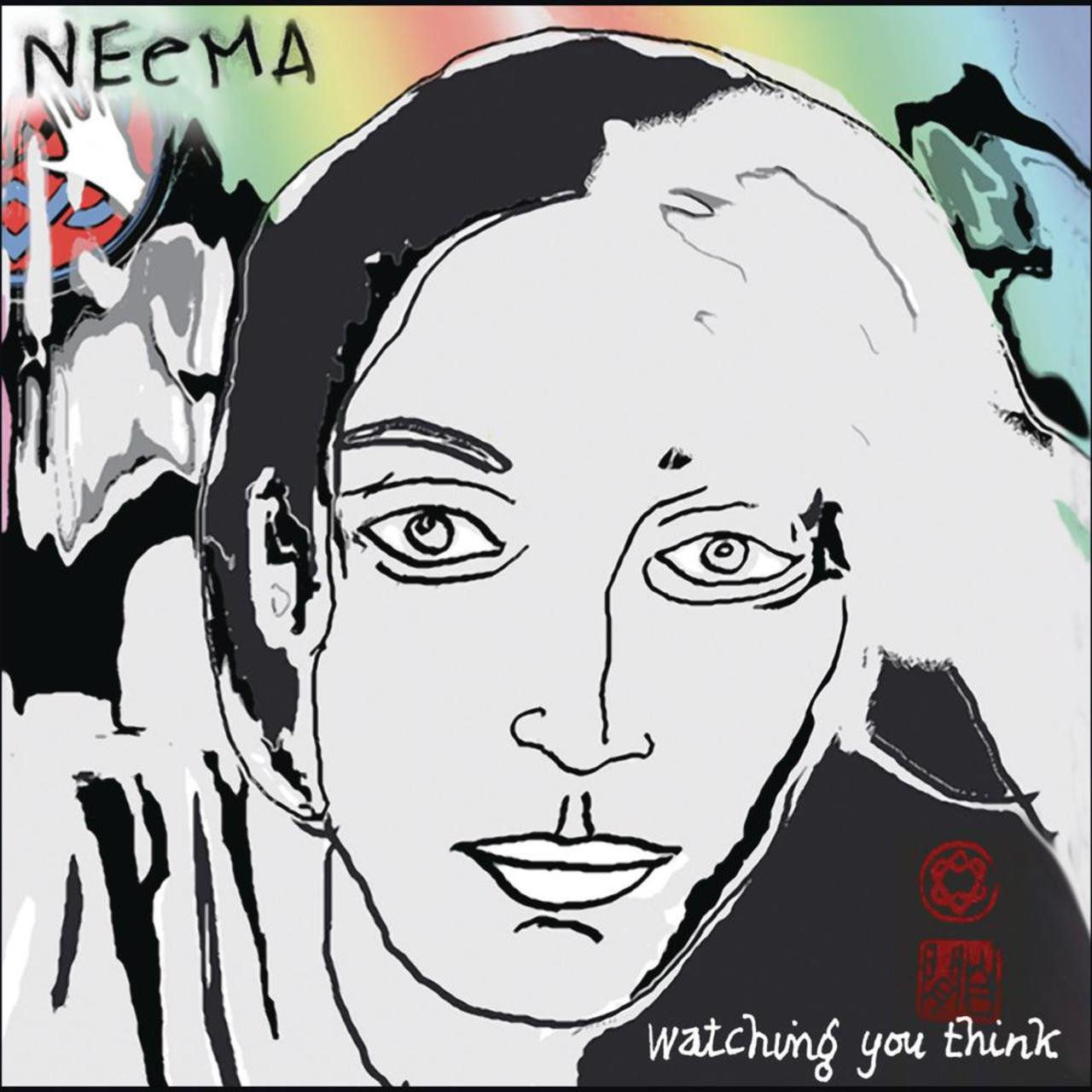
Evelyn: I find it fits with being introverted. Sensitive.
NEeMA: Yeah.
Evelyn Reid: I find that with an introverted person, you see more of them when they’re silent versus when they’re actually talking.
NEeMA: Yeah. Very true.
Evelyn Reid: On the topic — and this is nothing more than an assumption, and I could be completely off-base — I get the impression with Leonard Cohen, that he’s a very hard man to get know these days, that he doesn’t let a lot of people in. Would you agree with that, and if you do, why did he let you in?
NEeMA: Hmmm, I don’t know. Somebody else asked me that today. Well, they didn’t ask me that, but the question they asked me was “what do you think it was that made you guys able to become good friends” or something like that.
And I thought, I don’t really know how to answer that. Those are the things in life you can’t really put your finger on. Why do two people become close? It could be a deep spiritual connection, it could be similar backgrounds, it could be …” [Music producer Piere Marchand walks into the room]. Pierre!
Oh, have you met Pierre Marchand yet? He, along with Leonard, helped me produce the album. He’s produced Sarah McLachlan, Ron Sexsmith …
Evelyn Reid: No, I haven’t. Hi, I’m Evelyn. Please to meet you.
Pierre Marchand: Pleased to meet you too.
NEeMA: But to answer your question, I don’t know the answer. I was surprised when somebody else asked me that today. It was the first time it was asked and I thought, you know, I could try and rationalize but whoever knows why two people cross paths? Some people say it’s written, some people say we have something to learn from each other. I just consider it a blessing and I never stopped to think why. It was something that I wished for years ago, that I could meet Leonard Cohen and share my work with him so it’s funny how it evolved because the friendship came first and you kind of look back and think “wow, it’s interesting how it happened.”
Evelyn Reid: Which brings me to my next questions. You met the Dalai Lama and you met Mother Teresa. How did that happen? In what context? I get the impression you were involved in a lot of NGO work.
NEeMA: Kind of.
Evelyn Reid: What’s the story there?
NEeMA: I was finishing my university in Australia, and I really got to know a lot about the Dalai Lama when I was in Australia. I got into doing meditation there a lot and …
Evelyn: … sorry to interrupt. What were you studying?
NEeMA: I was studying a degree in management. Bachelor’s in commerce. Crazy huh. I was supposed to come back here to go to law school. So I finished my degree there. I did mainly philosophy in the last semester and I finished my degree and I was like “what am I doing with my life” so then I started backpacking. I stayed in Australia for a while, then I backpacked through Indonesia, Malaysia, Thailand, but while I was in Australia, I heard a lot about the Dalai Lama. And India. A lot of people in Australia have been to India.
Evelyn Reid: Right.
NEeMA: And being this kind of spiritual searcher, just being really interested in that kind of path…
Evelyn Reid: …being a spiritual searcher without actually belonging to a specific denomination?
NEeMA: Yeah. Just being open and being curious and being interested in the human condition. Here we are. Who knows where we come from, where we’re going or why we’re here. We’re here. This has always fascinated me, so I set out with the intention to go to India when I decided to backpack. So I go to India, and a good friend of mine from high school happened to be in India at the same time and she met Mother Teresa. It was six months before she passed away. It was in Calcutta. It was this place called the Mother House. At six in the morning she used to give mass there. But this time she was in a wheelchair, sitting in the back. So I went there intentionally to see her. I got up early, I was walking … you know in Calcutta, the streets, the sidewalks are just filled with people sleeping … it is so poor. Have you been to India?
Evelyn Reid: No, I haven’t yet.
NEeMA: It is so poor. But at the same time, it is so beautiful and the people have such, in many ways the people are almost happier there…
Evelyn Reid: …than here.
NEeMA: Yeah. It’s this real paradox. They have such deep, spiritual beliefs and there’s this collective consciousness that they share that’s just really beautiful. It’s a really gorgeous place. But Calcutta was hard, watching people pulling rickshaws running with bare feet, people pulling you, people sleeping on the sidewalk. So I got up and went at six in the morning to see her. So that’s how my encounter with Mother Teresa happened.
Evelyn Reid: And the Dalai Lama? How did you meet him?
NEeMA: And the Dalai Lama? It was kind of similar in the sense that I kept traveling. I stopped in Varanasi, which I loved. It’s where they do their rituals, burning dead bodies and throwing them in the Ganges. People go every morning at sunrise and then at sunset and bathe in that water. It’s so crazy but it’s so powerful and poignant. Then I went to Rishikesh, another very spiritual place where it’s the mouth of the Ganges.
Then I went to Daram Masala, the home of many Tibetan refugees. And it’s the home of the Dalai Lama. So there, I spent a month and a half sitting with Tibetan monks twice a day, while they did their singing and dancing and chanting called puja. And I spent time teaching them English and then one day, the Dalai Lama was making a public appearance at his monastery.
Lots of people go, and you kind of sit and wait and then you get in line and then one by one, he takes your hand, gives you a blessing and gives you a red ribbon. So that’s how my encounter with him happened.
Evelyn Reid: I’m jealous. [Laughter]
NEeMA: Don’t be. [Laughter]
Evelyn Reid: I’m not sure if you’re comfortable talking about this. But you recently lost your sister. And just comparing Masi Cho, your first album to your second, I find your second offering has this gentle melancholy, this sense of quiet resignation that I didn’t pick up on before. Has this had an impact on Watching You Think?
NEeMA: I’m not sure. My sister passed away when we were mixing the album and she’d been sick for years so it was certainly, probably an influence.
The album is dedicated to her but I don’t know, there’s a certain sense of life, maturity, and it may be in part influenced by Leonard [Cohen]. I remember when he was first giving me feedback, he was like, “it’s very good, but I wanna see you be more personal.” Someone else asked about that today and he listened to both albums and said the second was more intimate and personal whereas the first one was more political.
But I don’t know, I’m not sure what it is but in thinking about it, I’m remembering a comment by Leonard about wanting to hear a more personal story, wanting me me to dig deeper. So maybe part of that is the result? And just life, its stories. It’s been some very intense years and the album just reflects that, as I make my way through those movements, how can I make sense of all that. The album is kind of that.
Evelyn Reid: And it’s 12 stories. Each song is a story. Are these stories based on your personal experiences? Are these stories all something that’s happened to you or are they more like bits and pieces of experience melded into fiction?
NEeMA: Well, “Romeo and Juliet” is a Dire Straits cover, so that’s not my story but I feel very connected to it. But the other songs?
Evelyn Reid: Yeah. I wanted to ask you about “Lost in LA” for example. Do you go there often?
NEeMA: Yes. I’ve been living in LA two to three months every year for the last five years. And that song… when I first lived there, I used to Mapquest everywhere I was going, I find my way there but get lost coming back and I thought I’ve got to write song about being lost in LA… but the actual song? It ended up being a metaphor for the craziness of life. It actually has nothing to do with being lost in LA. But LA just represents the craziness of the world. But yeah, overall, I think they all stem from personal stories but then a song takes on a life of its own. The “you” in a song might change over time, but they certainly are my personal experiences in life, that’s definitely where they come from.
Evelyn Reid: I wanted to ask you about what we were talking about before I started recording, about being a introverted, sensitive human being, which is the impression I get with you. How do you keep it together in the “roughness” that is the music industry?
NEeMA: I know what you mean. Sometimes I just take off and take a seven-day retreat.
Evelyn Reid: Vipassana style?
NEeMA: Yes, I’ve done that in Australia. Or I’ll take long walks in nature. Yoga. Just finding those quiet moments and taking them in when I can. And people. Keep the ones you really connect with the closest to you because they understand you and you understand them; you don’t have to play the game. Then there’s eating healthy foods, try to get enough sleep, and dance. I dance a lot!
Evelyn Reid: And you lived in a small isolated Aboriginal community north of Yellowknife, with the Tlicho First Nation People?
NEeMA: Yes. In Wekweeti. That was a huge part of my life. I lived seven years up there. Almost three years full-time up north and the rest of the time was back and forth. I helped them negotiate their land claims and self-government agreements so I helped set up their community governments. So initially, I was there managing the community for a few years, but then I helped do that. So my time with them was a good seven years.
Evelyn Reid: How did you end up doing that?
NEeMA: You know, it was crazy. I was living in Egypt for seven months. It was an exchange program through the Canadian government for graduates to gain experience in their field. I had done management but was thinking “what am I doing in management?” And I graduated with high distinction. I come from that kind of family, the kind that pushes you in math and science and here am I, thinking, what am I doing?
Evelyn Reid: I hear ya. I have my DEC in commerce so …
NEeMA: Oh you do! [Laughter] So you understand! But my natural inclination is towards people, towards children, towards culture, towards spirituality. So in Alexandria, I went to this store one day, and there was this little kid who didn’t go to school, a little kid about seven years old. He was the delivery boy for this store I used to go to. He used to come to my house and bring me my groceries. I started to talking to him and I found out how many kids there were nearby who support their families. Every Friday, which is their holiday, they’d come over to my place. Every Friday, a bunch of kids would come over and we would draw, sing songs and we just kind of worked together.
Evelyn Reid: So this would be like a creativity afternoon?
NEeMA: Yeah, a creativity afternoon. Teaching them English a little bit, and teaching music, singing to help them express themselves, through drawing too, and also just to help out.
Like there was one family I got very close to, I’d come to their house and help out. The whole family lived in this tiny little room and it was so humid in there, it was very difficult. While I was working with the kids there, I met an amazing voice teacher and an amazing guitar teacher, somebody who had a studio, so I took lessons every day and I went to record. And that’s when I really got into music, when I was in Egypt. Then I came back to Montreal, but was going to go back to Egypt and conduct some research, and that’s when I found out about this job opening in the north.
Evelyn Reid: And your management background came in handy?
NEeMA: Yeah! If for no other reason, I was going to get this job to put my management background to use! So I signed on for six months and ended up there for another two and half years. I really learned about living off the land with them, hunting, understanding that connection with the land. I mean, there were more bears up there than people. You feel so tiny in this huge expanse of nature and at the same time, you feel like you can do anything.
For more information on purchasing Watching You Think or Masi Cho, visit NEeMA’s official website and watch a video of “Escape”, one of the tracks off of Watching You Think.
NEeMA: Leonard Cohen Protégé Talks Diamonds, Dalai Lama & Meeting Her Mentor
by Evelyn Reid
Originally published on About.com June 28, 2010
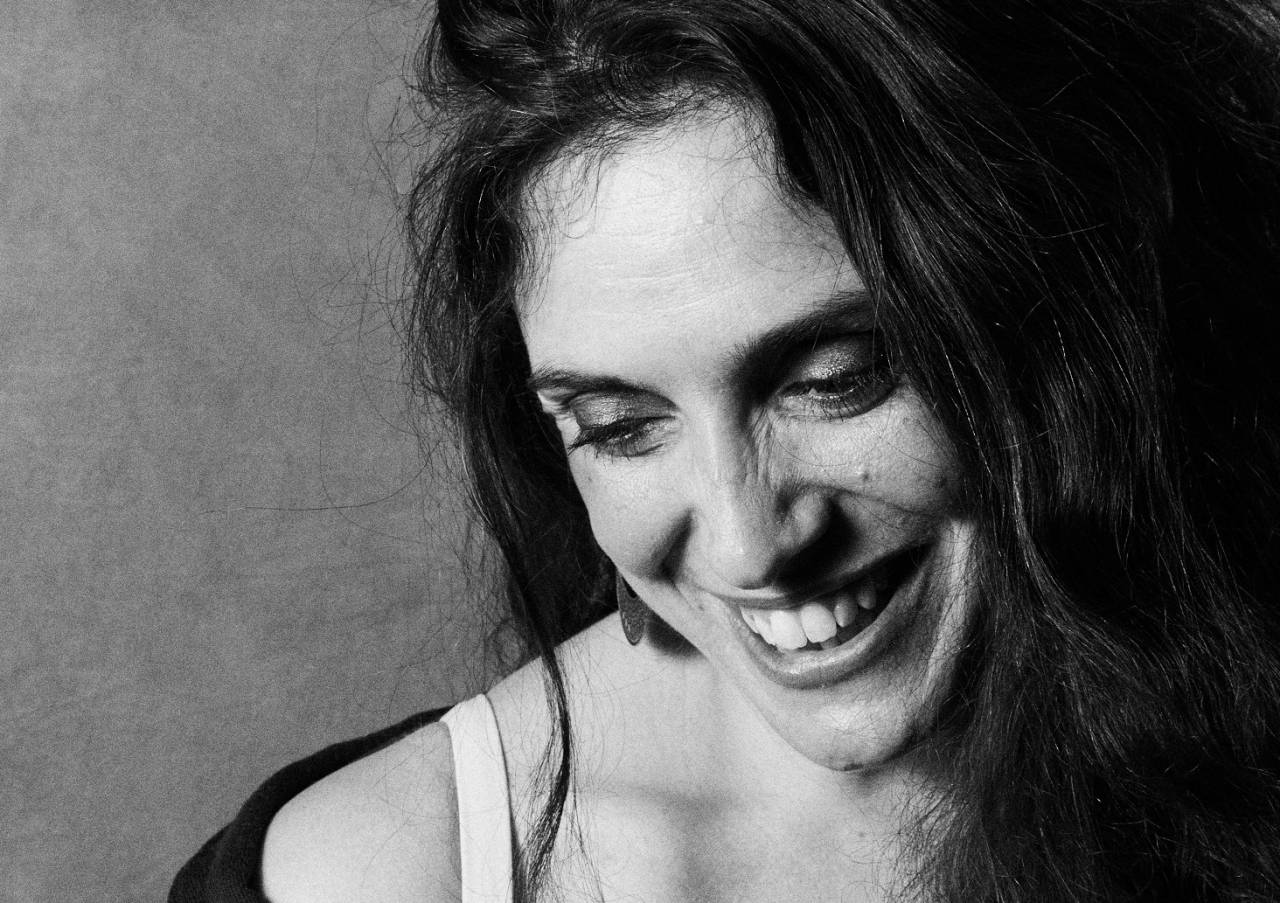
Photo courtesy of NEeMa
NEeMA, born Nadine Neemeh, beams whenever she speaks of Leonard Cohen, her friend and mentor, an instrumental force in the production of her second album Watching You Think. On the road since it was released in the summer of 2010, the singer-songwriter played at the Montreal Jazz Festival and POP Montreal, wrapping up a North American tour later in 2011.
I had a chance to sit down with her that summer to discover a well-traveled past, including brushes with Mother Teresa, the Dalai Lama, and a seven-year-old Egyptian delivery boy too busy supporting his family to go to school.
But it was back home in Montreal that she met Cohen, the elusive legend who pushed her and her sound to go to depths she hadn’t yet explored on her own.

Above: Leonard Cohen in concert circa 2008 (original photo by Rama , modified by Clint Lewis (CC BY-SA 2.0 FR).
“He gave me his feedback,
which was sometimes really, really hard,
and sometimes
really great.”
June 28, 2010 – I’ve been inside the Maison du Festival—the Montreal Jazz Festival’s headquarters—several times before, but never from this particular vantage point, in a “green room” on the top floor of overlooking Place des festivals, a public square host to the city’s largest outdoor concerts.
There’s something uncommonly warm about NEeMA.
She’s radiant. She speaks using a calm, crystalline tone with a mild rasp to it, not unlike her singing voice. We’re about to begin our chat, but as per usual, I’m fumbling with my sound recorder, testing and retesting it lest I misquote whom I’m interviewing. “Sorry about this,” I say, frowning, “I’m never ready, it seems.”
NEeMA smiles. “That’s what Leonard said.”
“At some point,” she continues, “years ago, before he was preparing a show—maybe it was the ’93 tour, I’m not sure—he was in his dressing room and a man came to the door. He said, ‘Mr. Cohen, are you ready?’.
Leonard looked at him and replied, ‘no. I’m not’.
And then the man looked back at Leonard and he said, ‘we’re never ready for the things we do in life. We’re never ready to be born. We’re never ready to get married. We’re never ready to die’. We’re never ready for the important things in life.”
She looks at my necklace. “Is that a moonstone?”
“It’s Labradorite. From Labrador,” I said. ”It’s not very expensive. Nothing fancy really.”
“Beautiful. It’s very beautiful.”
“Thanks. Can you believe I prefer it to diamonds?”
Her bright doe eyes look down as she motions to a bracelet on her arm. “Actually, speaking of diamonds, I generally prefer that kind of thing too, like you. But my mother brought me back this diamond bracelet from Egypt, which is, like, crazy. I think because I don’t have a husband, she keeps doing these kind of things! It’s really cute. So now she bought me this bracelet and I’m touched, I understand the whole [sentiment], it’s very sweet, dainty and beautiful but, yeah, it’s the first time I ever had any diamond anything. ”
It is a beautiful bracelet, diamonds or not. “I’ve never owned diamonds either,” I admit. “Guess I’m a pretty simple girl. I don’t even have my ears pierced. I just wear my little necklace with a little charm, like amber, that kind of thing .” and then, I snap out of it. “Wait, this [interview] isn’t about me. This is supposed to be about you!” I smile, slightly embarrassed.
She smiles back. It’s a real one, the kind that crinkles the eyes.

Evelyn Reid: So your mom is Egyptian?
NEeMA: Both my parents are born and raised in Egypt but originally from Lebanon.
Evelyn Reid: From Lebanon.
NEeMA: And then from Egypt, they moved to Canada.
Evelyn Reid: My next question is burning on my tongue. You’re associated with Leonard Cohen… and everyone wants to know, how did that come about? Did you find him? Did he find you?
NEeMA: I hypnotized him.
Evelyn Reid: [Laughter].
NEeMA: We found each other. It’s the truth. We kind of bumped into each other. We live in the same neighborhood.
Evelyn Reid: The Plateau?
NEeMA: Yeah, the Plateau, like, really close to each other and one day we literally bumped into each other and we said “hi.” I was like, “hi, I’m Neema,” he was like “hi, I’m Leonard,” and I was like, “I know,” and then we just kind of started meeting.
We just started going to cafés, going to the park. And he started to draw me and I started to… well, first we became friends, and we just had a lot of natural things that were very dear to both us, that were in common to both of us, our deep spiritual quests, the Semitic background… a lot of things that were natural, just kind of common ground, and the writing… I started to share my writing with him, and then he started to draw me and it just kind of became part of the friendship and then he became a huge, huge source of support and help, like a mentor or teacher on the album, when I was finishing my first album. So, it was years ago, almost five years ago now.”
Evelyn Reid: The first album … Masi?
NEeMA: Masi Cho. “Masi” comes from “merci”… yes, so I just started sharing songs with him. And he gave me his feedback, which was sometimes really, really hard, and sometimes really great. But he, of course, has very high standards for writing, so he certainly doesn’t dish out compliments when it comes to writing.
Sometimes it was like, “I don’t hear the song here, you should start over. Your idea is great but you should just start from scratch.” Then I’d go home and I’d be crushed. Then I’d wake up the next day with a whole new motivation, because I’m also the type of person who wants to go deeper and I’m really interested in not just scratching the surface. I love being pushed further and I love being given constructive criticism, especially from someone I admire so much. And when he would say “this song is amazing,” I’d be like …
Evelyn Reid: You knew.
NEeMA: I knew. I knew he really, really meant it. Or sometimes, there would be a verse and we’d actually sit and work on it together. Or he’d give me some direction, or some writing assignment, or whatever. It was always very enriching. So that’s kind of how it happened. It just started from a chance encounter and then built into a friendship, and that friendship evolved into working together, just sharing my work and getting feedback. And then when I started recording the album, he continued to be [there], getting more involved. I would basically have listening sessions with him every time I went to the studio and he’d give me his feedback on what he heard: the instrumentation, the voice, everything, right up to putting his drawing on the cover. It was a pretty big involvement which was beautiful.
Evelyn Reid: Yes, his drawing “Watching You Think.” I was there for the vernissage.
NEeMA: Were you there?
Evelyn Reid: Yes.
NEeMA: Ah, nice.
Evelyn Reid: I was busy taking pictures of all the drawings.
NEeMA: I was there too.
Evelyn Reid: There were a lot of people.
NEeMA: Yes, there were. Do you remember the drawing “Watching You Think”?
Evelyn Reid: I do. I was going to ask you that actually, the chicken/egg question. Which came first? The painting or the album name? Looks like it’s the painting …
NEeMA: The painting. Yeah. The painting came first, a couple of years ago and then, uhm, actually, I’m not exactly sure when the painting came but it’s been a while, it’s been exhibited a lot and then, one day we just… he’s done several paintings and I was looking at this one and I was like, “does this seem like a good album cover?” And he said, “yeah.” There’s something very striking about that one. It has some kind of resemblance to me.
Evelyn Reid: I didn’t recognize you when I first saw it.
NEeMA: But look at it now that you know. I don’t find it looks like me like it’s a picture of me but it has a feeling of me. There’s something that is a feeling, you know? It’s very interesting. So he said “absolutely, you’re most welcome to use it.” And then I was trying to find the name of the album, and he said, “why don’t you use the name of the portrait?” And I realized Watching You Think is perfect. It’s perfect in so many ways. Not just because it’s the title of the drawing but the album itself is very intimate so the title “Watching You Think” is so perfect, so beautiful…

Evelyn: I find it fits with being introverted. Sensitive.
NEeMA: Yeah.
Evelyn Reid: I find that with an introverted person, you see more of them when they’re silent versus when they’re actually talking.
NEeMA: Yeah. Very true.
Evelyn Reid: On the topic — and this is nothing more than an assumption, and I could be completely off-base — I get the impression with Leonard Cohen, that he’s a very hard man to get know these days, that he doesn’t let a lot of people in. Would you agree with that, and if you do, why did he let you in?
NEeMA: Hmmm, I don’t know. Somebody else asked me that today. Well, they didn’t ask me that, but the question they asked me was “what do you think it was that made you guys able to become good friends” or something like that.
And I thought, I don’t really know how to answer that. Those are the things in life you can’t really put your finger on. Why do two people become close? It could be a deep spiritual connection, it could be similar backgrounds, it could be …” [Music producer Piere Marchand walks into the room]. Pierre!
Oh, have you met Pierre Marchand yet? He, along with Leonard, helped me produce the album. He’s produced Sarah McLachlan, Ron Sexsmith …
Evelyn Reid: No, I haven’t. Hi, I’m Evelyn. Please to meet you.
Pierre Marchand: Pleased to meet you too.
NEeMA: But to answer your question, I don’t know the answer. I was surprised when somebody else asked me that today. It was the first time it was asked and I thought, you know, I could try and rationalize but whoever knows why two people cross paths? Some people say it’s written, some people say we have something to learn from each other. I just consider it a blessing and I never stopped to think why. It was something that I wished for years ago, that I could meet Leonard Cohen and share my work with him so it’s funny how it evolved because the friendship came first and you kind of look back and think “wow, it’s interesting how it happened.”
Evelyn Reid: Which brings me to my next questions. You met the Dalai Lama and you met Mother Teresa. How did that happen? In what context? I get the impression you were involved in a lot of NGO work.
NEeMA: Kind of.
Evelyn Reid: What’s the story there?
NEeMA: I was finishing my university in Australia, and I really got to know a lot about the Dalai Lama when I was in Australia. I got into doing meditation there a lot and …
Evelyn: … sorry to interrupt. What were you studying?
NEeMA: I was studying a degree in management. Bachelor’s in commerce. Crazy huh. I was supposed to come back here to go to law school. So I finished my degree there. I did mainly philosophy in the last semester and I finished my degree and I was like “what am I doing with my life” so then I started backpacking. I stayed in Australia for a while, then I backpacked through Indonesia, Malaysia, Thailand, but while I was in Australia, I heard a lot about the Dalai Lama. And India. A lot of people in Australia have been to India.
Evelyn Reid: Right.
NEeMA: And being this kind of spiritual searcher, just being really interested in that kind of path…
Evelyn Reid: …being a spiritual searcher without actually belonging to a specific denomination?
NEeMA: Yeah. Just being open and being curious and being interested in the human condition. Here we are. Who knows where we come from, where we’re going or why we’re here. We’re here. This has always fascinated me, so I set out with the intention to go to India when I decided to backpack. So I go to India, and a good friend of mine from high school happened to be in India at the same time and she met Mother Teresa. It was six months before she passed away. It was in Calcutta. It was this place called the Mother House. At six in the morning she used to give mass there. But this time she was in a wheelchair, sitting in the back. So I went there intentionally to see her. I got up early, I was walking … you know in Calcutta, the streets, the sidewalks are just filled with people sleeping … it is so poor. Have you been to India?
Evelyn Reid: No, I haven’t yet.
NEeMA: It is so poor. But at the same time, it is so beautiful and the people have such, in many ways the people are almost happier there…
Evelyn Reid: …than here.
NEeMA: Yeah. It’s this real paradox. They have such deep, spiritual beliefs and there’s this collective consciousness that they share that’s just really beautiful. It’s a really gorgeous place. But Calcutta was hard, watching people pulling rickshaws running with bare feet, people pulling you, people sleeping on the sidewalk. So I got up and went at six in the morning to see her. So that’s how my encounter with Mother Teresa happened.
Evelyn Reid: And the Dalai Lama? How did you meet him?
NEeMA: And the Dalai Lama? It was kind of similar in the sense that I kept traveling. I stopped in Varanasi, which I loved. It’s where they do their rituals, burning dead bodies and throwing them in the Ganges. People go every morning at sunrise and then at sunset and bathe in that water. It’s so crazy but it’s so powerful and poignant. Then I went to Rishikesh, another very spiritual place where it’s the mouth of the Ganges.
Then I went to Daram Masala, the home of many Tibetan refugees. And it’s the home of the Dalai Lama. So there, I spent a month and a half sitting with Tibetan monks twice a day, while they did their singing and dancing and chanting called puja. And I spent time teaching them English and then one day, the Dalai Lama was making a public appearance at his monastery.
Lots of people go, and you kind of sit and wait and then you get in line and then one by one, he takes your hand, gives you a blessing and gives you a red ribbon. So that’s how my encounter with him happened.
Evelyn Reid: I’m jealous. [Laughter]
NEeMA: Don’t be. [Laughter]
Evelyn Reid: I’m not sure if you’re comfortable talking about this. But you recently lost your sister. And just comparing Masi Cho, your first album to your second, I find your second offering has this gentle melancholy, this sense of quiet resignation that I didn’t pick up on before. Has this had an impact on Watching You Think?
NEeMA: I’m not sure. My sister passed away when we were mixing the album and she’d been sick for years so it was certainly, probably an influence.
The album is dedicated to her but I don’t know, there’s a certain sense of life, maturity, and it may be in part influenced by Leonard [Cohen]. I remember when he was first giving me feedback, he was like, “it’s very good, but I wanna see you be more personal.” Someone else asked about that today and he listened to both albums and said the second was more intimate and personal whereas the first one was more political.
But I don’t know, I’m not sure what it is but in thinking about it, I’m remembering a comment by Leonard about wanting to hear a more personal story, wanting me me to dig deeper. So maybe part of that is the result? And just life, its stories. It’s been some very intense years and the album just reflects that, as I make my way through those movements, how can I make sense of all that. The album is kind of that.
Evelyn Reid: And it’s 12 stories. Each song is a story. Are these stories based on your personal experiences? Are these stories all something that’s happened to you or are they more like bits and pieces of experience melded into fiction?
NEeMA: Well, “Romeo and Juliet” is a Dire Straits cover, so that’s not my story but I feel very connected to it. But the other songs?
Evelyn Reid: Yeah. I wanted to ask you about “Lost in LA” for example. Do you go there often?
NEeMA: Yes. I’ve been living in LA two to three months every year for the last five years. And that song… when I first lived there, I used to Mapquest everywhere I was going, I find my way there but get lost coming back and I thought I’ve got to write song about being lost in LA… but the actual song? It ended up being a metaphor for the craziness of life. It actually has nothing to do with being lost in LA. But LA just represents the craziness of the world. But yeah, overall, I think they all stem from personal stories but then a song takes on a life of its own. The “you” in a song might change over time, but they certainly are my personal experiences in life, that’s definitely where they come from.
Evelyn Reid: I wanted to ask you about what we were talking about before I started recording, about being a introverted, sensitive human being, which is the impression I get with you. How do you keep it together in the “roughness” that is the music industry?
NEeMA: I know what you mean. Sometimes I just take off and take a seven-day retreat.
Evelyn Reid: Vipassana style?
NEeMA: Yes, I’ve done that in Australia. Or I’ll take long walks in nature. Yoga. Just finding those quiet moments and taking them in when I can. And people. Keep the ones you really connect with the closest to you because they understand you and you understand them; you don’t have to play the game. Then there’s eating healthy foods, try to get enough sleep, and dance. I dance a lot!
Evelyn Reid: And you lived in a small isolated Aboriginal community north of Yellowknife, with the Tlicho First Nation People?
NEeMA: Yes. In Wekweeti. That was a huge part of my life. I lived seven years up there. Almost three years full-time up north and the rest of the time was back and forth. I helped them negotiate their land claims and self-government agreements so I helped set up their community governments. So initially, I was there managing the community for a few years, but then I helped do that. So my time with them was a good seven years.
Evelyn Reid: How did you end up doing that?
NEeMA: You know, it was crazy. I was living in Egypt for seven months. It was an exchange program through the Canadian government for graduates to gain experience in their field. I had done management but was thinking “what am I doing in management?” And I graduated with high distinction. I come from that kind of family, the kind that pushes you in math and science and here am I, thinking, what am I doing?
Evelyn Reid: I hear ya. I have my DEC in commerce so …
NEeMA: Oh you do! [Laughter] So you understand! But my natural inclination is towards people, towards children, towards culture, towards spirituality. So in Alexandria, I went to this store one day, and there was this little kid who didn’t go to school, a little kid about seven years old. He was the delivery boy for this store I used to go to. He used to come to my house and bring me my groceries. I started to talking to him and I found out how many kids there were nearby who support their families. Every Friday, which is their holiday, they’d come over to my place. Every Friday, a bunch of kids would come over and we would draw, sing songs and we just kind of worked together.
Evelyn Reid: So this would be like a creativity afternoon?
NEeMA: Yeah, a creativity afternoon. Teaching them English a little bit, and teaching music, singing to help them express themselves, through drawing too, and also just to help out.
Like there was one family I got very close to, I’d come to their house and help out. The whole family lived in this tiny little room and it was so humid in there, it was very difficult. While I was working with the kids there, I met an amazing voice teacher and an amazing guitar teacher, somebody who had a studio, so I took lessons every day and I went to record. And that’s when I really got into music, when I was in Egypt. Then I came back to Montreal, but was going to go back to Egypt and conduct some research, and that’s when I found out about this job opening in the north.
Evelyn Reid: And your management background came in handy?
NEeMA: Yeah! If for no other reason, I was going to get this job to put my management background to use! So I signed on for six months and ended up there for another two and half years. I really learned about living off the land with them, hunting, understanding that connection with the land. I mean, there were more bears up there than people. You feel so tiny in this huge expanse of nature and at the same time, you feel like you can do anything.
For more information on purchasing Watching You Think or Masi Cho, visit NEeMA’s official website and watch a video of “Escape”, one of the tracks off of Watching You Think.
